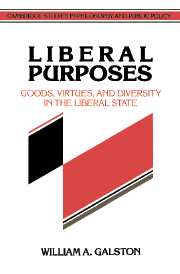Book contents
- Frontmatter
- Contents
- Acknowledgments
- PART I LIBERALISM AND POLITICAL PHILOSOPHY
- 1 Introduction
- 2 Peirce's cable and Plato's cave: objectivity and community in contemporary political philosophy
- 3 Contemporary critics of liberalism
- PART II LIBERALISM AND NEUTRALITY
- PART III LIBERALISM WITHOUT NEUTRALITY
- PART IV FROM THEORY TO PRACTICE IN THE LIBERAL STATE
- Notes
- Index
- Frontmatter
- Contents
- Acknowledgments
- PART I LIBERALISM AND POLITICAL PHILOSOPHY
- 1 Introduction
- 2 Peirce's cable and Plato's cave: objectivity and community in contemporary political philosophy
- 3 Contemporary critics of liberalism
- PART II LIBERALISM AND NEUTRALITY
- PART III LIBERALISM WITHOUT NEUTRALITY
- PART IV FROM THEORY TO PRACTICE IN THE LIBERAL STATE
- Notes
- Index
Summary
This is a book about liberalism. Its central thesis is that the modern liberal state is best understood as energized by a distinctive ensemble of public purposes that guide liberal public policy, shape liberal justice, require the practice of liberal virtues, and rest on a liberal public culture. Liberal purposes, so conceived, define what the members of a liberal community must have in common. These purposes are the unity that undergirds liberal diversity; they provide the basis on which e pluribus unum ceases to be a raw and shifting balance of contending social forces and becomes instead an ethically meaningful characterization of the liberal state.
This affirmative thesis entails a triple negation. The liberal state cannot be understood along Michael Oakeshott's lines as a purposeless civil association structured by adverbial rules. Like every other form of political community, the liberal state is an enterprise association. Its distinctiveness lies not in the absence but, rather, in the content of its public purposes.
Nor can the liberal state be properly understood as “neutral” in any of the senses in which that term is currently employed. Like every other political community, it embraces a view of the human good that favors certain ways of life and tilts against others.
Nor, finally, can the liberal state be understood as an arena for the unfettered expression of “difference.” In the very act of sustaining diversity, liberal unity circumscribes diversity.
- Type
- Chapter
- Information
- Liberal PurposesGoods, Virtues, and Diversity in the Liberal State, pp. 3 - 21Publisher: Cambridge University PressPrint publication year: 1991



